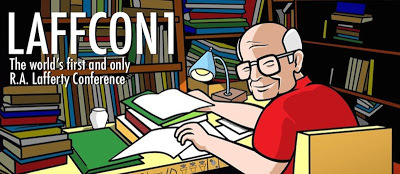R. A. Lafferty and the New Wave
.

Laffcon 1 was held in the Mercer County Library in Lawrenceville, New Jersey, on Saturday. Something like forty people attended, almost all of them exceptionally knowledgable on the subject of the life and works of R. A. Lafferty.
It's hard to say what was the best part of the day. Possibly the presentation (by Gregorio Montejo, I think; my notes are a mess) on "Lafferty and the Visual Arts," which, on the strength of a single closet door, all that survives of Lafferty's collage art, made the case for Lafferty as an outsider artist. (Albeit not your usual outsider artist.) Or maybe Andrew Mass's early selection from the documentary movie he's making about Lafferty. It was heartening to see how much was being done to preserve the memory of the man and his works, and how high the quality of the work was.
The chief item I was on was a panel on "Lafferty and the New Wave." We didn't settle the question of exactly what Ray's relationship with the New Wave was then. But on reflection, I decided that it was relatively -- for Lafferty, anyway -- straightforward.
Ray definitely didn't identify himself with the New Wave and disliked most of the work published under that heading. But most of his readership did identify him with it. So how did an extremely religious autodidact and self-characterized grumpy old man (I should mention that everybody who met him thought he was very sweet) find himself in that position?
Context is all. The New Wave coincided roughly with what we like to call "the Sixties," a period which, confusingly enough, began midway through the decade and extended well into the Seventies. There was, among the young, a widespread rejection of old values, old ideas, and old ways of doing things. People were looking for new ideas, new ways of seeing things, new ways of doing things. A lot of what the New Wave writers were up to was trying to provide exactly those. And also new ways of telling stories.
Well, it turns out that new ideas and new ways of telling stories are pretty rare. But Lafferty had both. So the seekers found him. And even after he carefully and repeatedly explained that not only was he not a member of the Counterculture (as it was then called) but thought its very existence was evil, they continued to revere him.
Because he was the real thing. We were all looking for visions and he was a visionary. That was, and is, far more important than whether he had the same politics as his readers.
*

Laffcon 1 was held in the Mercer County Library in Lawrenceville, New Jersey, on Saturday. Something like forty people attended, almost all of them exceptionally knowledgable on the subject of the life and works of R. A. Lafferty.
It's hard to say what was the best part of the day. Possibly the presentation (by Gregorio Montejo, I think; my notes are a mess) on "Lafferty and the Visual Arts," which, on the strength of a single closet door, all that survives of Lafferty's collage art, made the case for Lafferty as an outsider artist. (Albeit not your usual outsider artist.) Or maybe Andrew Mass's early selection from the documentary movie he's making about Lafferty. It was heartening to see how much was being done to preserve the memory of the man and his works, and how high the quality of the work was.
The chief item I was on was a panel on "Lafferty and the New Wave." We didn't settle the question of exactly what Ray's relationship with the New Wave was then. But on reflection, I decided that it was relatively -- for Lafferty, anyway -- straightforward.
Ray definitely didn't identify himself with the New Wave and disliked most of the work published under that heading. But most of his readership did identify him with it. So how did an extremely religious autodidact and self-characterized grumpy old man (I should mention that everybody who met him thought he was very sweet) find himself in that position?
Context is all. The New Wave coincided roughly with what we like to call "the Sixties," a period which, confusingly enough, began midway through the decade and extended well into the Seventies. There was, among the young, a widespread rejection of old values, old ideas, and old ways of doing things. People were looking for new ideas, new ways of seeing things, new ways of doing things. A lot of what the New Wave writers were up to was trying to provide exactly those. And also new ways of telling stories.
Well, it turns out that new ideas and new ways of telling stories are pretty rare. But Lafferty had both. So the seekers found him. And even after he carefully and repeatedly explained that not only was he not a member of the Counterculture (as it was then called) but thought its very existence was evil, they continued to revere him.
Because he was the real thing. We were all looking for visions and he was a visionary. That was, and is, far more important than whether he had the same politics as his readers.
*
Published on June 06, 2016 13:13
No comments have been added yet.
Michael Swanwick's Blog
- Michael Swanwick's profile
- 546 followers
Michael Swanwick isn't a Goodreads Author
(yet),
but they
do have a blog,
so here are some recent posts imported from
their feed.



